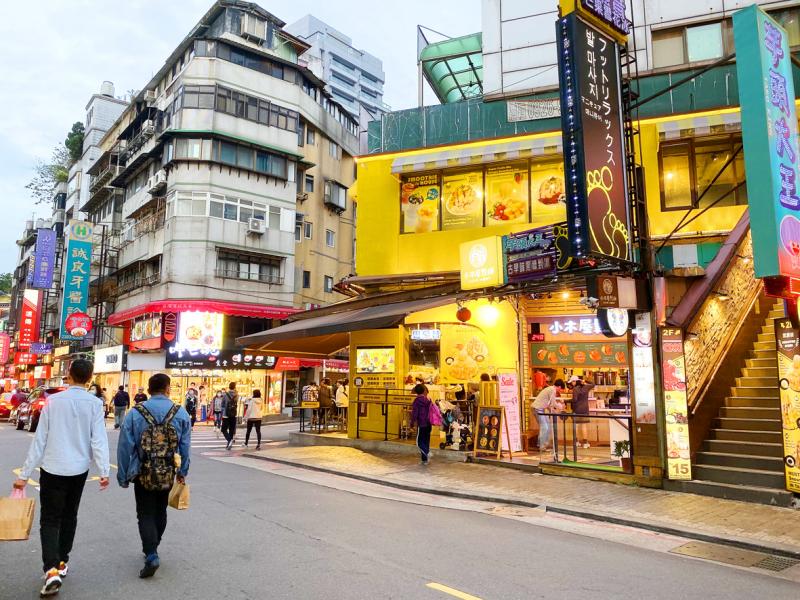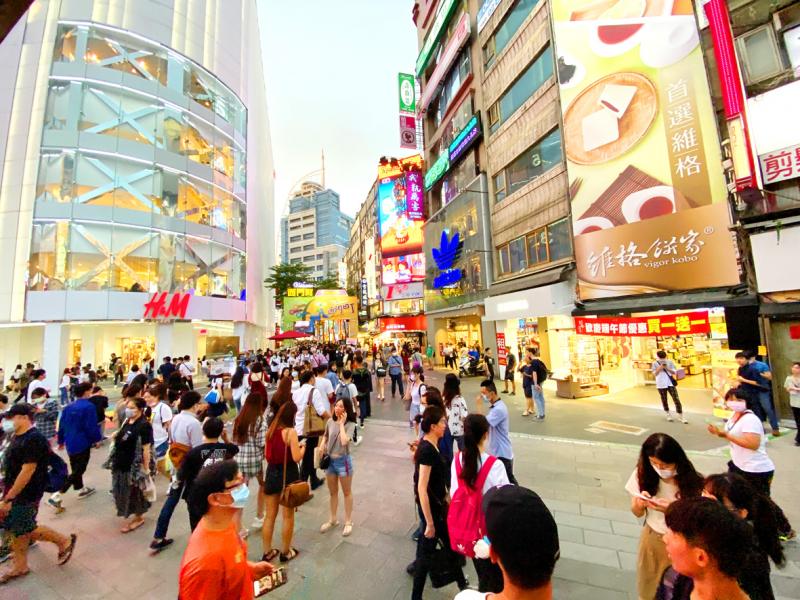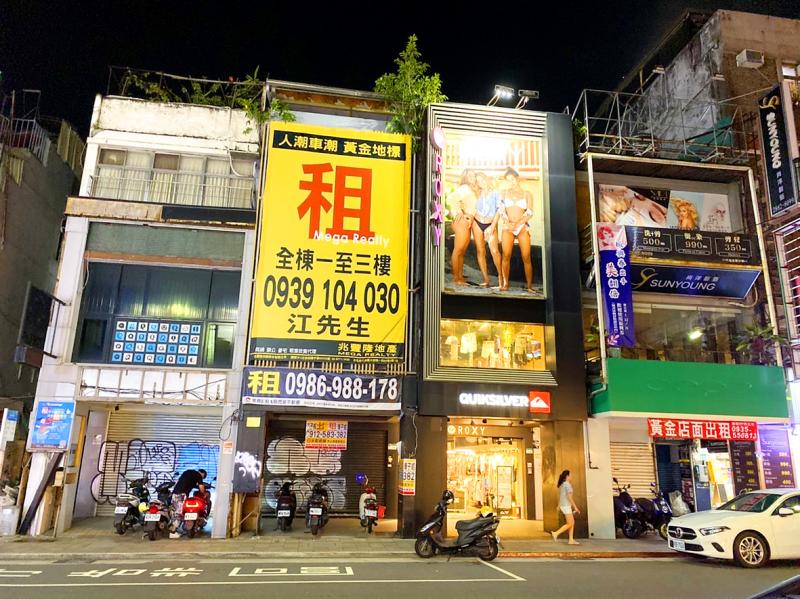Commercial lease rates in three major shopping districts in Taipei are spiraling lower amid a steep decline in foreign visitors caused by the COVID-19 pandemic, local business associations said.
Overseas visitor arrivals were down 86 percent in the first 10 months of the year, and the loss of 8.4 million foreign tourists has dealt a particularly heavy blow to some of the more popular areas tourists visit in Taipei.
Among the hardest hit by the COVID-19 travel restrictions that continue to keep foreign visitors away is the Yongkang Street area, normally a big hit with Japanese, South Koreans and Hong Kongers.

Photo: Yang Hsin-hui, Taipei Times
One indicator of the decline in traffic there is the 17.8 percent year-on-year fall in people entering or exiting the nearby Dongmen MRT station in the first 11 months of the year, representing 1.55 million fewer potential consumers checking out Yongkang Street shops.
Since the beginning of this year, at least 40 businesses in the area have closed, and several others are planning to shut this month, Taipei Dongmen Yongkang Business Circle Development Association president Liu Hung-hsiang (劉鴻翔) said.
Ice Monster (冰館), a shaved ice dessert shop chain, opened its shop on Yongkang Street in 1995, but has announced plans to close the shop by the end of the year, as has nearby rival King Mango (芒果皇帝).

Photo: Cheng Ming-hsiang, Taipei Times
High rents were the final straw for many retailers, resulting in the closure of some well-established businesses, said Chen Chieh-ming (陳傑鳴), director of housing research center Ubee (屋比).
With traffic down and tenants abandoning the area, monthly rents for retail spaces in the district have fallen to about NT$6,000 per ping (3.3m2) from more than NT$10,000 before the pandemic, Chen said.
They could fall even further as more retail spaces in prime locations in the area become available, he said.

Photo: Yang Hsin-hui, Taipei Times
The government should offer tax breaks and preferential water and electricity rates to retailers, and landlords should reduce rents to help business owners survive the hard times brought on by the pandemic, Liu said.
The association has planned a series of shopping events in the Yongkang shopping zone to attract customers and has collaborated with food delivery platforms to help boost business, Liu said.
The two other areas where rental rates are tumbling amid the decline in visitor numbers are Ximending (西門町) and the Shilin Night Market (士林夜市).
Liu Chia-hsin (劉家鑫), chairman of the Taipei City Ximending Pedestrian Zone Development Promotion Association, said that businesses in Xinmending were hurt by the pandemic, but have gradually recovered since July, with food and beverage outlets seeing sales return to 80 to 90 percent of pre-pandemic levels.
However, rents for retail space remain depressed, having fallen by 30 to 50 percent to NT$10,000 to NT$12,000 per ping per month.
Business in the Shilin Night Market has been hurt, because about 70 percent of its pre-pandemic traffic came from overseas tourists.
However, the area has also been hurt by its reputation for overpriced goods after local media last year reported that one vendor had charged a foreign tourist more than NT$1,000 for a bag of cut fruit, Shilin Night Market Development and Promotion Association director Su Wen-shan (蘇文山) said.
That has made it hard to lure domestic consumers to make up for the fall in overseas tourists, Su said.
As a result, monthly store rents in area have fallen on average by about 20 to 30 percent, with the rent for a shop on Wenlin Road down to about NT$3,500 per ping, he said.
Su said that the crisis could offer the night market an opportunity to reposition itself to domestic consumers.
The association would work with high schools and colleges in the neighborhood on polls to identify the best vendors and publicize the lists to help give local consumers confidence about visiting the night market, he said.

CHIP WAR: Tariffs on Taiwanese chips would prompt companies to move their factories, but not necessarily to the US, unleashing a ‘global cross-sector tariff war’ US President Donald Trump would “shoot himself in the foot” if he follows through on his recent pledge to impose higher tariffs on Taiwanese and other foreign semiconductors entering the US, analysts said. Trump’s plans to raise tariffs on chips manufactured in Taiwan to as high as 100 percent would backfire, macroeconomist Henry Wu (吳嘉隆) said. He would “shoot himself in the foot,” Wu said on Saturday, as such economic measures would lead Taiwanese chip suppliers to pass on additional costs to their US clients and consumers, and ultimately cause another wave of inflation. Trump has claimed that Taiwan took up to

A start-up in Mexico is trying to help get a handle on one coastal city’s plastic waste problem by converting it into gasoline, diesel and other fuels. With less than 10 percent of the world’s plastics being recycled, Petgas’ idea is that rather than letting discarded plastic become waste, it can become productive again as fuel. Petgas developed a machine in the port city of Boca del Rio that uses pyrolysis, a thermodynamic process that heats plastics in the absence of oxygen, breaking it down to produce gasoline, diesel, kerosene, paraffin and coke. Petgas chief technology officer Carlos Parraguirre Diaz said that in

SUPPORT: The government said it would help firms deal with supply disruptions, after Trump signed orders imposing tariffs of 25 percent on imports from Canada and Mexico The government pledged to help companies with operations in Mexico, such as iPhone assembler Hon Hai Precision Industry Co (鴻海精密), also known as Foxconn Technology Group (富士康科技集團), shift production lines and investment if needed to deal with higher US tariffs. The Ministry of Economic Affairs yesterday announced measures to help local firms cope with the US tariff increases on Canada, Mexico, China and other potential areas. The ministry said that it would establish an investment and trade service center in the US to help Taiwanese firms assess the investment environment in different US states, plan supply chain relocation strategies and

Japan intends to closely monitor the impact on its currency of US President Donald Trump’s new tariffs and is worried about the international fallout from the trade imposts, Japanese Minister of Finance Katsunobu Kato said. “We need to carefully see how the exchange rate and other factors will be affected and what form US monetary policy will take in the future,” Kato said yesterday in an interview with Fuji Television. Japan is very concerned about how the tariffs might impact the global economy, he added. Kato spoke as nations and firms brace for potential repercussions after Trump unleashed the first salvo of